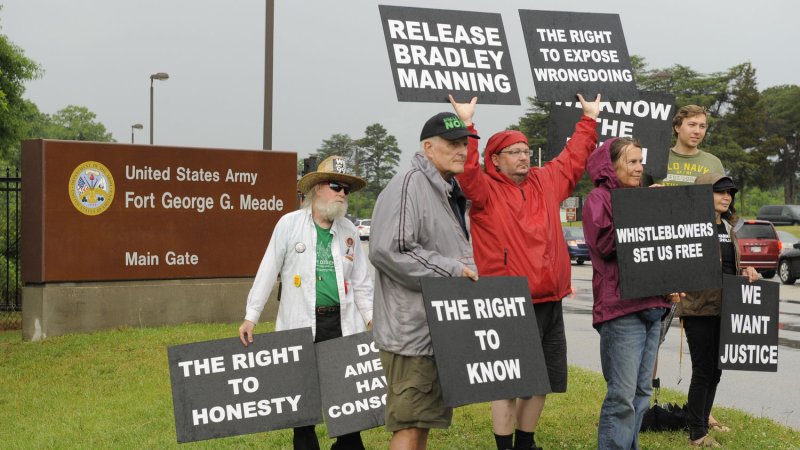Protestors from various organizations gather to protest the start of the court martial of US Army PFC Bradley Manning, outside the front gate of Fort Meade, Maryland, June 3, 2013. A military judge acquitted Manning of aiding the enemy Tuesday but convicted him of five counts of violating the espionage act. The sentencing phase of the trial is to begin on Wednesday. UPI/Mike Theiler |
License Photo
FORT MEADE, Md., July 30 (UPI) -- U.S. Army Pfc. Bradley Manning could spend the rest of his life in prison despite his acquittal Tuesday of aiding the enemy, lawyers say.
Col. Denise Lind, a military judge who heard the case without a jury, plans to begin the sentencing hearing Wednesday, the Los Angeles Times reported.
Lind found Manning not guilty of aiding the enemy, which carried a sentence of life, after the government said it would not seek the death penalty. She found him guilty of violations of the espionage act, leaving him open to a long cumulative sentence.
Manning, 25, who has been in custody since 2010, admitted leaking 700,000 classified documents, including thousands of diplomatic cables, to WikiLeaks. He pleaded guilty to lesser charges in February, but the government decided to proceed with the court martial.
During the trial, which began in June, the courtroom was full of Manning supporters who consider him a hero who exposed government wrongdoing. Prosecutors argued he helped al-Qaida by making information available to them, even if that was not his primary purpose.
The leak was the largest ever in U.S. history and Manning was the first leaker to be charged with aiding the enemy. His lawyer and supporters described him as a whistle-blower.
The National Whistleblower Center, in a statement after the verdict, said the prosecution overreached.
"It was wrong for the government to charge Mr. Manning with the offense of 'aiding the enemy.' Mr. Manning pleaded guilty to lesser offenses related to his disclosure of classified information. That should have ended the case," the center said. "Charging a whistle-blower with the crime of 'aiding the enemy,' simply because the whistle-blower provided information to the news media, was wrong and was designed to improperly scare other citizens into silence."
Manning admitted in February he was WikiLeaks' source for the material, which included videos of a 2007 Baghdad airstrike and a 2009 airstrike in Afghanistan in which civilians were killed. The leaked information included 250,000 U.S. diplomatic cables and 500,000 Army reports that came to be known as the Iraq War logs and Afghan War logs.
The disclosures were the largest set of restricted documents ever leaked to the public -- much of it published by WikiLeaks or its media partners from April to November 2010.
Manning's guilty pleas carry a possible sentence of 20 years in prison.
The court-martial began June 3 and wrapped up with closing arguments last week.
The prosecution portrayed Manning as an "anarchist" and a traitor who wanted to "make a splash," knowing the leaked documents would end up in the hands of al-Qaida.
His defense lawyer portrayed him as a naive but well-intentioned humanistic soldier who wanted the released documents to spark debate about U.S. foreign policy and bring about change.
Defense attorney David Coombs said Manning was selective about which databases he released to avoid causing harm.
Coombs has said he believes the case could end up being heard by the U.S. Supreme Court, Manning supporters said Monday.















